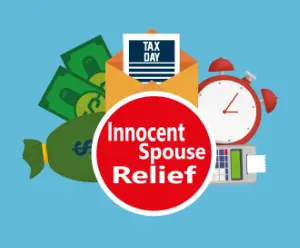
Understanding the IRS Substitute for Return
Click to ask Mike Ask Mike The Internal Revenue Service (IRS) Substitute for Return (SFR) is a term many taxpayers

When it comes to taxes, the complexities of joint filings can sometimes lead to unforeseen consequences. One such consequence is the “innocent spouse” rule, a provision in tax law that protects individuals from being held liable for their spouse’s tax liabilities in certain situations. In this article, we will delve into the concept of the innocent spouse, exploring what it is, who may qualify, and the process of seeking innocent spouse tax relief.
What is an Innocent Spouse
An innocent spouse is a taxpayer who files a joint tax return with their spouse but seeks relief from the responsibility of paying the entire tax liability that arises from that return. Typically, this situation arises when one spouse discovers that their partner has failed to report income, claimed erroneous deductions, or engaged in fraudulent activities on the tax return. In such cases, the innocent spouse may feel unjustly burdened by the tax debt.
Qualification for Innocent Spouse Relief
To qualify for innocent spouse relief, the taxpayer must meet specific criteria established by the Internal Revenue Service (IRS). The primary conditions include:
Types of Innocent Spouse Relief
The IRS offers three types of innocent spouse relief:
The Application Process
Applying for innocent spouse relief involves submitting IRS Form 8857, the Request for Innocent Spouse Relief. The form requires detailed information about the joint tax return, the inaccuracies or fraud, and the reasons why the innocent spouse should not be held responsible.
It’s important to note that the innocent spouse must provide all necessary documentation to support their claim. The IRS will then review the case and make a determination.
Understanding the concept of the innocent spouse and the available tax relief options is crucial for those who find themselves in a challenging financial situation due to their spouse’s actions. Seeking innocent spouse relief can provide much-needed protection from an unjust tax burden.
You can now ask our AI assistant any questions you have about your tax debt or any tax-related issues. Whether you’re unsure about payment plans, need clarification on penalties, or want information on how to resolve your tax situation. Our AI is ready to assist you with all your tax-related concerns.
You can now ask our AI assistant any questions you have about your tax debt or any tax-related issues. Whether you’re unsure about payment plans, need clarification on penalties, or want information on how to resolve your tax situation. Our AI is ready to assist you with all your tax-related concerns.

By interacting with our AI assistance, you agree to our terms & conditions. Enjoy our AI Tax Assistant responsibly.
Ask me any questions...
Related Posts

Click to ask Mike Ask Mike The Internal Revenue Service (IRS) Substitute for Return (SFR) is a term many taxpayers

Click to ask Mike Ask Mike The Internal Revenue Service (IRS) Substitute for Return (SFR) is a term many taxpayers

Click to ask Mike Ask Mike The Internal Revenue Service typically operates within a 10-year window, commencing from the

Click to ask Mike Ask Mike The Internal Revenue Service (IRS) operates within specific timeframes dictated by statutes of limitations

Click to ask Mike Ask Mike understanding the ins and outs of the 10-year statute of limitations (SOL) is essential.
Recent Posts

Click to ask Mike Ask Mike The Internal Revenue Service (IRS) Substitute for Return (SFR) is a term many taxpayers

Click to ask Mike Ask Mike The Internal Revenue Service (IRS) Substitute for Return (SFR) is a term many taxpayers

Click to ask Mike Ask Mike The Internal Revenue Service typically operates within a 10-year window, commencing from the

Click to ask Mike Ask Mike The Internal Revenue Service (IRS) operates within specific timeframes dictated by statutes of limitations

Click to ask Mike Ask Mike understanding the ins and outs of the 10-year statute of limitations (SOL) is essential.
Disclaimer: This is educational content, not legal, accounting, or tax advice.
This is a tax debt resource website, not to be used in lieu of a tax attorney or for legal advice. All information, Ai chat responses, articles, materials, and content are intended to inform users on a variety of tax topics. In no way is it intended to be construed as accounting, legal, tax, other services or advice. This site is not intended to be used to avoid tax penalties or tax debt that may be imposed by law. Terms and Conditions. Your use of this site constitutes acceptance of the following terms and conditions.
This is a tax debt resource website, not to be used in lieu of a tax attorney or for legal advice. All information, Ai chat responses, articles, materials, and content are intended to inform users on a variety of tax topics. In no way is it intended to be construed as accounting, legal, tax, other services or advice. This site is not intended to be used to avoid tax penalties or tax debt that may be imposed by law. Terms and Conditions. Your use of this site constitutes acceptance of the following terms and conditions.
© 2023 · Tax Debt Monster, Inc. All rights reserved

For all Tax Professionals that would like to partner up with us. By partnering with us, you’ll help us connect and make a positive impact in the tax community. Partner up with us and receive a complimentary Ai Tax Sidekick to help support your clients at no cost! Click here if you’re interested in our Partner-Up program

By interacting with our AI assistance, you agree to our terms & conditions. Enjoy our AI Tax Assistant responsibly.
How may I help you with your tax issue?